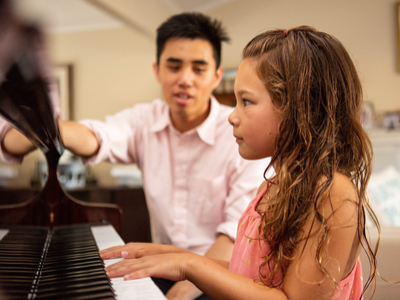How Do Music Lessons Benefit Children?
As a parent, you want what is best for your child – even if it means encouraging them to learn something that goes beyond their regular school curriculum. Extra-curricular activities provide a well-rounded education for your child helping them develop skills beyond academic ones. Learning how to play an instrument, sing, and understand music theory can help your child develop skills that will help them succeed throughout life. In fact, many of the skills that children develop through music lessons are highly in demand by employers the world over. Music also gives children’s academic skills a boost. This is how music lessons can boost your child’s skills.
Academic Skills:
We’ve delved into the academic skills that children develop when they study music more thoroughly in this article. A quick look at some of the disciplines music can help your child with in school include:
Reading and Comprehension: Children who study music learn to distinguish different pitches at an early age. This helps them distinguish between the different sounds of various consonants, vowels, and combinations of these. This helps children develop their reading abilities. Think about it, the letters ‘t’ and ‘d’ can sound similar in certain words while ‘rough’ and ‘through’ sound completely different.
Math: When you break it down, rhythm is all mathematical. In fact, certain rhythmical patterns involve fairly complex mathematics. Kids who study music also study mathematics without realizing it and having fun to boot.
Speech: Although not a strict academic subject, being able to speak clearly can help with delivering presentations or reading out loud in class. Singing lessons or even the act of singing notes out loud while learning an instrument can help your child’s fluency. In fact, many children with a stutter can sing clearly (as music uses a different part of the brain) helping them develop confidence in their abilities.
Soft Skills:
As mentioned earlier, music doesn’t just give academic skills a boost. It helps children develop skills that employers are constantly on the look out for like creativity, critical thinking, discipline, and time management. By giving your child the opportunity to learn music, you’re giving them the chance to develop soft skills that they will fall back on for life.
Cultural Awareness: Music crosses the barriers of distance and language. By studying music, your children are exposed to music from different cultures in various languages. This helps them develop an interest in learning about the world and empathizing with people from cultures, backgrounds, and ethnicities beyond their own.
Problem Solving and Critical Thinking Abilities: Playing music also requires problem-solving skills. As they continue learning, children also learn to identify issues with their playing and find ways to correct them. This practice is valuable in any job that requires analytical thinking. Music lessons also teach kids how to come up with different solutions to problems, evaluate their results, and make adjustments to their ideas. This helps them develop critical thinking skills by processing the information given and coming up with their own solution.
Leadership Skills: Whether your child is learning to play the piano, harmonica, trumpet, or is learning to sing, they need to practice to achieve the results they want. This self-discipline is a trait that most leadership programs look out for.
Teamwork: Musicians rarely perform alone. As your child works with their peers or other musicians to achieve a common goal, like for a recital for example, they learn to work as a team.
Time Management: Children must balance their practice time with other activities, such as schoolwork and socializing. These skills are valuable in any job that requires managing multiple tasks.
Adaptability: Musicians must be able to adjust their playing style based on the audience, the venue, or even their fellow musicians. A large part of studying music involves live performances, helping your child learn adaptability along with the ability to think on their feet. These skills are valuable in any job that requires flexibility.
The most important skill that music teaches any child is how to have fun, even when you’re working hard. Give your child that extra boost they need in today’s competitive world by giving them the opportunity to study music.
NUVO Music School offers in-home and online music lessons throughout White Rock, South Surrey, Surrey, and Delta. With over 25 teachers and hundreds of satisfied students, NUVO Music School is well-equipped to provide high-quality, personalized education to your children.
Register for music lessons online today or call us at (604) 614-3340 for more information.

